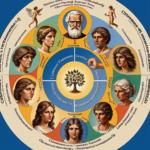Book Link 07 Video: Intro to Psychology
<back next> — index
Instructions
Watch a 10 minute video about what Psychology means. Where does psychology come from? This video introduces psychology’s history, and some of the big names in the development of the field.
The history of psychology began with ancient philosophers like Plato and Aristotle who were interested in understanding the mind and behavior. In the 19th century, psychology started to be recognized as a separate field with the work of Wilhelm Wundt, who is often called the “father of psychology.”
Over time, psychology has grown to include different areas like clinical psychology, cognitive psychology, and social psychology, helping us understand the human mind and behavior in many ways.
What is Psychology?
Psychology is the scientific study of behavior and mental processes. Early Thinkers in Psychology – Early thinkers in psychology laid the foundation for the field through their theories and experiments.
Psychology is the scientific study of behavior and mental processes. It seeks to understand how and why people think, feel, and act as they do. For young adults considering college, an understanding of psychology can be beneficial in various ways.
It can help them gain insights into their own behavior and mental processes, aiding in personal growth and self-awareness. Additionally, knowledge of psychology can be valuable in various fields of study, such as education, sociology, and healthcare.
Big Questions in Psychology
Big questions in psychology include the nature-nurture debate and the study of consciousness.
Big questions in psychology include the nature-nurture debate, which examines the influences of genetics and environment on behavior and mental processes. Another significant question is the study of consciousness and its various states.
For young adults considering college, these big questions can stimulate critical thinking and intellectual curiosity. Understanding these fundamental questions can help them develop a broader perspective and a deeper appreciation for the complexities of human behavior and the mind.
Disciplines of Psychology
There are various disciplines within psychology, such as clinical, developmental, and social psychology. Psychology encompasses various disciplines, including clinical, developmental, and social psychology.
Each discipline offers unique insights into different aspects of human behavior and mental processes. For young adults considering college, exploring these disciplines can help them identify their areas of interest and potential career paths.
Understanding the diverse fields within psychology can guide them in choosing a major or career that aligns with their passions and aspirations.
Structuralism
Structuralism was an early school of psychology that focused on the analysis of the basic elements that constitute the mind.
Structuralism was an early school of psychology that focused on the analysis of the basic elements that constitute the mind. For young adults considering college, understanding structuralism can provide a historical foundation for the study of psychology.
It can also introduce them to the concept of breaking down complex phenomena into simpler components, which is a valuable skill in academic and professional pursuits.
Functionalism
Functionalism focused on the purpose of mental processes and behavior in helping individuals adapt to their environment.
Functionalism focused on the purpose of mental processes and behavior in helping individuals adapt to their environment. For young adults considering college, the principles of functionalism can offer insights into the adaptive nature of human behavior and cognition.
Understanding functionalism can help students appreciate the practical applications of psychological theories in addressing real-world challenges and enhancing personal effectiveness.
Psychoanalysis
Psychoanalysis is a psychological theory and therapy that aims to bring unconscious thoughts and feelings to conscious awareness.
Psychoanalysis is a psychological theory and therapy that aims to bring unconscious thoughts and feelings to conscious awareness. For young adults considering college or trade school, an understanding of psychoanalysis can be particularly relevant. It can provide insight into the complexities of human thought and emotion, helping students navigate the challenges of higher education.
By gaining awareness of their unconscious motivations and emotions, students can develop a deeper understanding of their aspirations, anxieties, and interpersonal relationships, which are crucial aspects of the college or trade school experience.
 Additionally, knowledge of psychoanalysis can offer valuable perspectives for emerging adults as they transition to college or trade school. It can help them recognize the impact of past experiences on their current behaviors and emotional responses, fostering personal growth and resilience.
Additionally, knowledge of psychoanalysis can offer valuable perspectives for emerging adults as they transition to college or trade school. It can help them recognize the impact of past experiences on their current behaviors and emotional responses, fostering personal growth and resilience.
Understanding the principles of psychoanalysis can also enhance students’ ability to cope with stress, adapt to new environments, and cultivate meaningful connections with peers and mentors. This self-awareness and emotional resilience can contribute to students’ overall well-being and academic success as they embark on their educational journeys.
Behaviorism
Behaviorism emphasizes the role of the environment in shaping behavior through conditioning and reinforcement.
Behaviorism emphasizes the role of the environment in shaping behavior through conditioning and reinforcement. For young adults considering college, an understanding of behaviorism can provide valuable insights into learning and motivation.
It can also offer practical strategies for personal development and academic success, such as effective study habits and behavior modification techniques.
Psychodynamic Theories
Psychodynamic theories explore the influence of unconscious drives and conflicts on behavior and mental processes.
Psychodynamic theories explore the influence of unconscious drives and conflicts on behavior and mental processes. For young adults considering college, understanding psychodynamic theories can shed light on the complexities of human motivation and emotional experiences.
It can also foster a deeper understanding of interpersonal dynamics and personal relationships, which are crucial aspects of the college experience.
Summary
 The history of psychology dates back to ancient philosophers like Plato and Aristotle, but it became recognized as a separate field in the 19th century with the work of Wilhelm Wundt.
The history of psychology dates back to ancient philosophers like Plato and Aristotle, but it became recognized as a separate field in the 19th century with the work of Wilhelm Wundt.
Psychology is the scientific study of behavior and mental processes, aiming to understand why people think, feel, and act as they do.
It can help with personal growth, self-awareness, and has applications in various fields like education and healthcare. Some fundamental questions in psychology include nature vs. nurture and the study of consciousness, which can broaden our perspective on human behavior and the mind.
Psychology encompasses different disciplines such as clinical, developmental, and social psychology, offering unique insights into human behavior. Understanding these disciplines can help students identify their areas of interest and potential career paths. Additionally, the text touches upon early schools of psychology like structuralism and functionalism, as well as psychoanalysis, which aims to bring unconscious thoughts and feelings to conscious awareness. Lastly, behaviorism emphasizes the influence of the environment on our actions.
Honeycutt Science by John Honeycutt is licensed under Creative Commons Attribution-NonCommercial 4.0 International